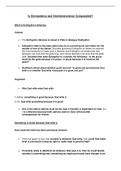Summary
Philosophy of Religion - Euthyphro Dilemma - Summary Revision Notes
- Module
- Philosophy of Religion
- Institution
- University Of Oxford
These revision notes formed part of the revision booklet I compiled to achieve a 1st class Philosophy and Theology Degree. This particular document contains the main arguments for this topic including the objections and replies. Also, the document contains quotes and arguments from key think...
[Show more]



